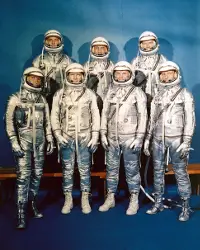The Race to the Moon
About three weeks after Shepard's historic flight, the U.S. President, John F. Kennedy, gave a speech before a joint session of Congress in which he called for his country to embark on a program that would send people to the Moon and get them home safely. Among other things, Kennedy said this: I believe that this nation should commit itself to achieving the goal, before this decade is out, of landing a man on the moon and returning him safely to the Earth. No single space project in this period will be more impressive to mankind, or more important for the long-range exploration of space; and none will be so difficult or expensive to accomplish. The first American to orbit was John Glenn, who achieved the feat in Friendship 7 on Feb. 20, 1962 and gained worldwide fame after his nearly five-hour flight. Kennedy was back in the public eye in September of that year, making a historic speech at Rice University. Among his remarks on Sept. 12, 1962, were the following: Those who came before us made certain that this country rode the first waves of the industrial revolutions, the first waves of modern invention, and the first wave of nuclear power, and this generation does not intend to founder in the backwash of the coming age of space. We mean to be a part of it--we mean to lead it. For the eyes of the world now look into space, to the moon and to the planets beyond, and we have vowed that we shall not see it governed by a hostile flag of conquest, but by a banner of freedom and peace. We have vowed that we shall not see space filled with weapons of mass destruction, but with instruments of knowledge and understanding. The most famous part of the speech was this:
 Kennedy's twin speeches served as a clarion call for a great many people in the U.S. Congress did allocate more funding to the space program. Scientific achievement reached the heights of interest and popularity. NASA also found itself overwhelmed with people applying to join the Astronaut Corps. NASA hired five groups of astronauts in all. The "Mercury Seven" were the seven astronauts who made up Astronaut Group 1. Six of those Seven flew in space, with one sidelined by a heart condition. The last Mercury astronaut to fly in space was Gordon Cooper, who completed 22 orbits in Faith 7 on a two-day mission, May 15–16, 1963. Meanwhile, the Soviet space program was racing ahead, with Gherman Titov aboard Vostok 2 completing 17 orbits and becoming the first person to sleep in space and other Vostok spacecraft linking up in space and establishing a radio link. It was Vostok 6 in 1963 that contained Valentina Tereshkova, the first woman in space. Next page > Gemini and an Apollo > Page 1, 2 , 3, 4, 5, 6, 7, 8 |
|
Social Studies for Kids
copyright 2002–2026
David White



 There is no strife, no prejudice, no national conflict in outer space as yet. Its hazards are hostile to us all. Its conquest deserves the best of all mankind, and its opportunity for peaceful cooperation many never come again. But why, some say, the moon? Why choose this as our goal? And they may well ask why climb the highest mountain? Why, 35 years ago, fly the Atlantic? ... We choose to go to the moon. We choose to go to the moon in this decade and do the other things, not because they are easy, but because they are hard, because that goal will serve to organize and measure the best of our energies and skills, because that challenge is one that we are willing to accept, one we are unwilling to postpone, and one which we intend to win."
There is no strife, no prejudice, no national conflict in outer space as yet. Its hazards are hostile to us all. Its conquest deserves the best of all mankind, and its opportunity for peaceful cooperation many never come again. But why, some say, the moon? Why choose this as our goal? And they may well ask why climb the highest mountain? Why, 35 years ago, fly the Atlantic? ... We choose to go to the moon. We choose to go to the moon in this decade and do the other things, not because they are easy, but because they are hard, because that goal will serve to organize and measure the best of our energies and skills, because that challenge is one that we are willing to accept, one we are unwilling to postpone, and one which we intend to win."

